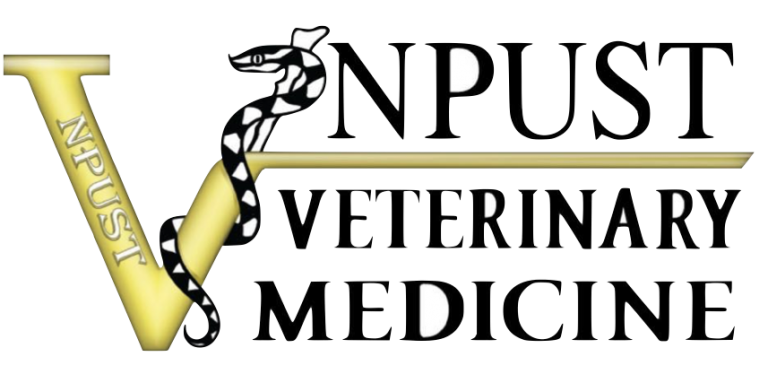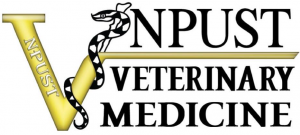Veterinary MedicineWelcome To NPUST VM
The Department aims to prepare our students to be veterinarians with sufficient medical knowledge and practical experience. Apart from the veterinary professional theory, curriculum courses also focus on veterinary clinical diagnosis, laboratory diagnostic techniques and practice drills. All the lecturers actively participate in the regional animal disease diagnosis and research services, besides providing assistance to the government and industry, this, also enriches the clinical diagnosis and treatment experience of the students. Our alumni contribute and thrive for the best in the animal husbandry and veterinary industry.
- 1924
Establishment of Kaohsiung State Pingtung Extension School of Agriculture - 1928
Establishment of Kaohsiung State Pingtung Agricultural School Animal Products Department - 1945
Establishment of Taiwan Provincial Pingtung Vocational School of Agriculture Veterinary Medicine Department - 1950
Establishment of Taiwan Provincial Pingtung Vocational School of Agriculture Animal Husbandry and Veterinary Medicine Department - 1959
Establishment of Taiwan Provincial Pingtung Senior Vocational High School of Agriculture - 1963
Incorporation of Pingtung Senior Agricultural vocational high school, recruitment of graduates from junior high school for a five-year course. - 1965
Division of Veterinary Husbandry into Bureau of Animal Husbandry and Veterinary Medicine. Students of the three-year program were required to complete a four-year course while students of the five-year program were required to complete a six-year course. Establishment of the Animal Hospital. - 1966
stablishment of Evening Division of Veterinary Medicine, recruitment of senior high school student for a five-year course. - 1975
The five-year program admission abolished. - 1986
The evening division admission abolished. - 1991
The renaming of university and department to National Pingtung Polytechnic Institute and Department of Veterinary Medicine respectively, recruitment of two-year program and four-year program students. The graduates were awarded with the Bachelor Degree of Veterinary Medicine. - 1997
Promotion of the university to National Pingtung University of Science and Technology. Master’s Degree Program added to the department. The graduates were awarded with the Master’s Degree of Veterinary Medicine. - 2000
Continuing Education Program for Working Veterinarians added to the department. The graduates were awarded with the Master’s Degree of Veterinary Medicine. - 2001
PhD Degree Program added to the department. The graduates were awarded the PhD Degree of Veterinary Medicine. - 2002
Two-year program of Bachelor Degree abolished. - 2010
Recruitment of undergraduate program students and distributing students into 2 classes. - 2002
Continuing Education Program for Working Veterinarians abolished.
Undergraduate – to nurture veterinary personnel and provide education and practices on epidemic prevention and quarantine of animals.
Postgraduate – to nurture research talent of the biotechnology industry with the aim of seeking treatment and solutions to animal diseases.
The development plan, faculties and equipment of the department are well-organized to ensure a stimulating educational environment. The department is currently preparing to build numerous animal consulting rooms for different kinds of animals and laboratory animal buildings, for better research and teaching, as well as assisting and solving problems of the government and industry. We aim to enhance the quality of the disease diagnosis as well as veterinary education to benefit the society and environment. The facilities was prepared to equip our students for the profession and life-long learning and we emphasize on developing transferable skills that are essential for the workplace to improve animal health and welfare.
1. Providing a complete research and training program.
The lecturers of our department and the professionals from Kaohsiung Medical University, National Taiwan University, National Chung Hsing University, National Chaiyi University and other universities or research organizations will work hand in hand to guide the students. All the research is carried out under strict standard not only to ensure the quality of doctoral graduates to meet the needs of the field and to improve the standard of veterinary studies of practical and vocational education.
2. Focus on the development of the industry, epidemic prevention and quarantine issues with the view of veterinary profession.
Integration of Veterinary Medicine Department and Animal Hospital has provided numerous animal disease diagnostic centers and laboratories which allow our research groups to meet the industrial needs. Strengthening the veterinary knowledge and disease diagnostic techniques is essential. The thesis of students will emphasize in the needs of the industry and the epidemic prevention and quarantine of the Government, such as enhancing diagnostic techniques, the development of vaccines, infectious disease research, and the technology of drug residual detection.
3. Cultivating students with advanced veterinary knowledge, accurate diagnosis and pragmatic personality.
To achieve excellence, the graduates will be trained by biotechnological specialists from the biotechnology center of our department, immunological diagnostic laboratory and the universities and research organizations nearby. We hope to excel in the biological techniques, for better diagnosis and prevention of animal diseases.
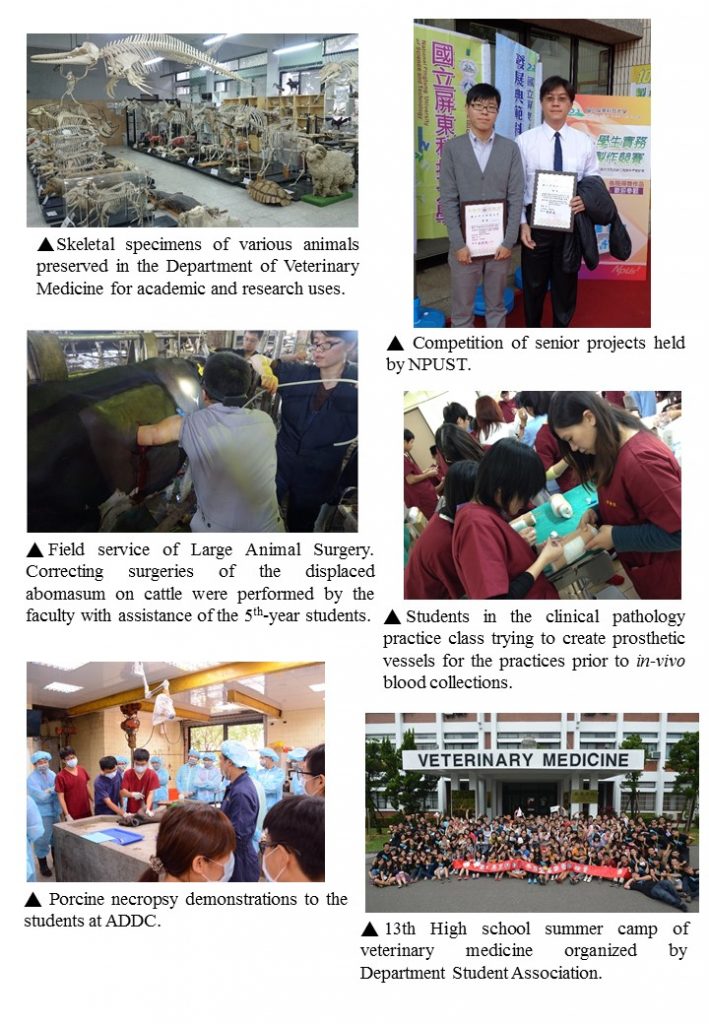
- Hso-Chi Chaung Professor
Vaccine research, Cytokine genetic diversity and immune function, Central nervous system - Ming-Tang Chiou Professor
Swine diseases, Disease diagnosis, Pathology, Immunology - Chao-Nan Lin Professor
Infectious diseases of swine, Wild life and companion animals - Yi-Lun Tsai Professor
Epidemiology, Zoonosis, disease of pathogenic vectors, Veterinary clinical pathology - Hung-Yi Wu Associate Professor
Clinical molecular medicine on avian and wild animals - Ming-Chu Cheng Associate Professor
Veterinary clinical microbiology, Poultry diseases, Avian influenza - Hsu-Hsun Lee Assistant Professor
Large animal disease diagnostics, Large animal surgical science, and Large animal reproductive disorders - Lee-Shuan Lin Assistant Professor
Small animal clinical care, Small animal advanced diagnostic imaging, and Inflammatory mechanism - Cheng-Shu Chung Assistant Professor
Stem cell & regenerative medicine, Small animal clinical science - Wen-Chi Lin Lecturer
Small animal internal medicine, and Wild and exotic Animal medicine - Yi-Chia Li Lecturer
Veterinary pathology, Comparative pathology, and Veterinary forensics - Ming-An Tsai Assistant Professor
Outbreak survey, Molecular epidemiological analysis, Antimicrobials resistance and developing rapid diagnostic methods of aquatic animal diseases - Chuen-Fu Lin Associate Professor
Veterinary anatomy, Veterinary pharmacology, and Veterinary bacteriology - Wei-Hao Lin Assistant ProfessorSwine disease, Veterinary clinical microbiology, Veterinary Pathology, Veterinary immunology, and Molecular biology
- Ya-Mei Chen Assistant Professor
Pathology, Lab animal medicine, Diagnostic pathology, Pathology and Molecular pathogenesis of enteric viruses - Kuo-Ping Shen Associate Professor
Pharmacology, Physiology, Metabolic syndrome - Yu-I Pan Lecturer
Animal production medicine, Large animal clinical nutrition, Ruminant digestive physiology - Ching-Hung Lin Assistant ProfessorZoonosis, Veterinary microbiology, Veterinary Pathology, and Molecular biology
- Szu-Ting Lin Assistant ProfessorEquine diagnostic Iimaging, Equine sports medicine, Traditional chinese veterinary acupuncture
- Ai-Mei Chang Assistant ProfessorWildlife diseases, Vaccinology, Development of immunocastraction vaccine, Reproductive physiology of wildlife & invasive species, non-invasive diagnostic techniques
***For more information, please click the name of Faculty***
|
Basic Information |
Name |
Yu-Qi Lin |
Position |
Administrative Officer |
|---|---|---|---|---|
|
Contact number |
08-7703202 ext. 5089 | |||
|
|
vm@mail.npust.edu.tw | |||
|
Substitute representative |
Technician Sheng-Chi Yu | |||
|
Job Description |
|
|||
|
Basic Information |
Name |
Sheng-Chi Yu |
Position |
Technician |
|---|---|---|---|---|
|
Contact number |
08-7703202 ext. 5438 | |||
|
|
sheng@mail.npust.edu.tw | |||
|
Substitute representative |
Officer Yu-Qi Lin | |||
|
Job Description |
|
|||
The total area for the Department of Veterinary Medicine and Animal Hospital is 11570.3 square meters. There are one Experiment Barn, three Quarantine Buildings, twenty Experimental Animal Buildings, one Marine Aquafarm and Traditional Chinese Medicine Farm. Besides the electron microscopes, we provide all kinds of complete equipment for advanced veterinary clinical diagnosis, treatment and research. According to different fields of study, 17 laboratories and animal diseases diagnostic centers were established.
◎Laboratories
We now have twenty-one laboratories, including aqua life diseases, poultry diseases, swine diseases, small animal diseases, large animal diseases, immunology and parasitology, laboratory diagnosis, comparative pathology, internal medicine and wildlife diseases, pharmacology, microbiology, molecular virology, physiology, zoology, surgery, anatomy, histology and veterinary clinical medicine…etc. These laboratories are responsible for the study of diseases from a wide variety of animals as cattle, swine, poultry, aqua life, wildlife, small animal and many others. For more information, please click the name of Faculty in the Faculty box.
◎Animal Hospital
There are Division of Large Animal, Division of Small Animal, Division of Aquatic Animal, Division of Pathology, Division of General Laboratory and Division of Pharmacy. These places provide internships for the veterinary students and good diagnosis service for patients.
◎Import Quarantine Center for Dogs and Cats:
It is responsible for small animal quarantine that entered from the Kaohsiung airport.
◎Electron Microscopes
The two sets of TEMs and three sets of SEMs are all placed in the Department of Veterinary Medicine.
◎The Juridical Person Lee Liang Yue Animal Husbandry and Veterinary Science Cultural and Educational Foundation Library:
The books are donated by the Department of Animal Husbandry and the Association of Veterinary Alumni to compensate the lack of books in the school library. There are about five thousand volumes of books with more than one hundred Chinese Veterinary Journal and dozens of western magazines in the library.
◎Practice and Laboratory Animal Facilities
There are several buildings for animal research and retainment.
◎Biotechnology Education Center
This Center is under the Agricultural Faculty. It is now placed in the Department of Veterinary Medicine. The center focus on the education and research of biotechnology.
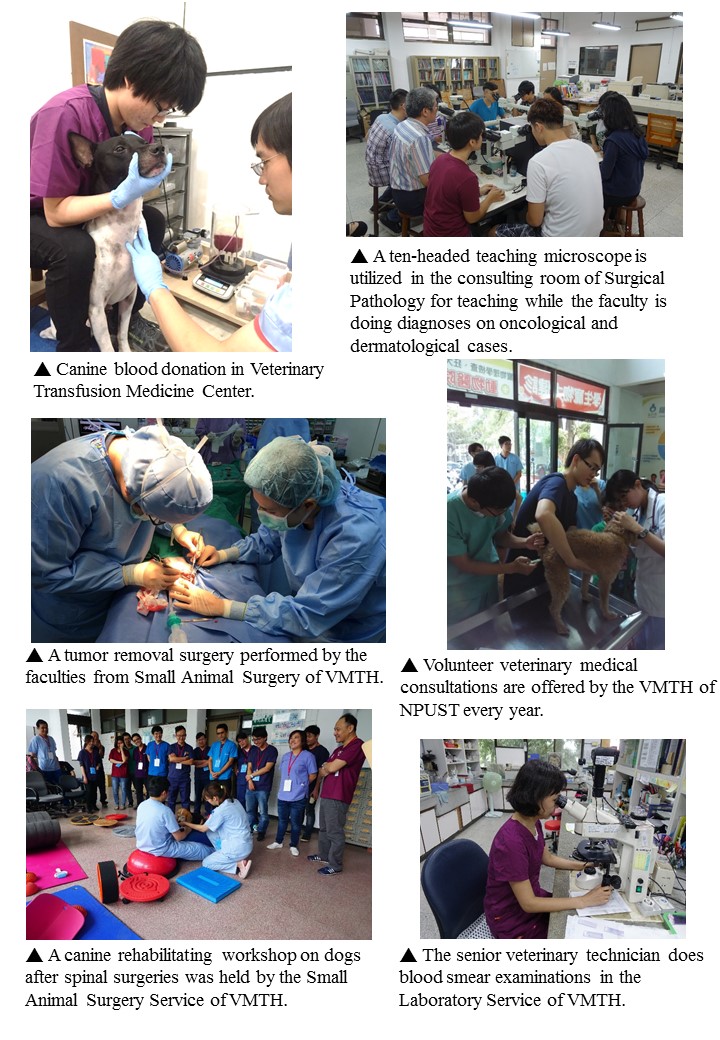
Mother and foreign language skills
Professional ethics and legal awareness
Basic medical knowledge
Subclinical medical knowledge
Ability to deal with herbivore, avian, swine, aquatic animal, companion animal and wildlife diseases
Mother language and foreign language skills
Professional ethics and legal awareness
Ability to deal with animal diseases
Research and development capabilities of the biotechnology industry
Career
To be able to practice as a veterinarian, at the Government service (such as the Council of Agriculture, Livestock Disease Control Center and District Office), private companies (such as feed mills, pharmaceutical industry, livestock farms, slaughterhouse veterinary staff), or self-employment.
Further Studies
Graduates can continue their study either abroad or apply for Programs such as Post-graduate programs offered by our Department, Biotechnology Research Institute, Institute of Wildlife Conservation, and other animal-related programs.
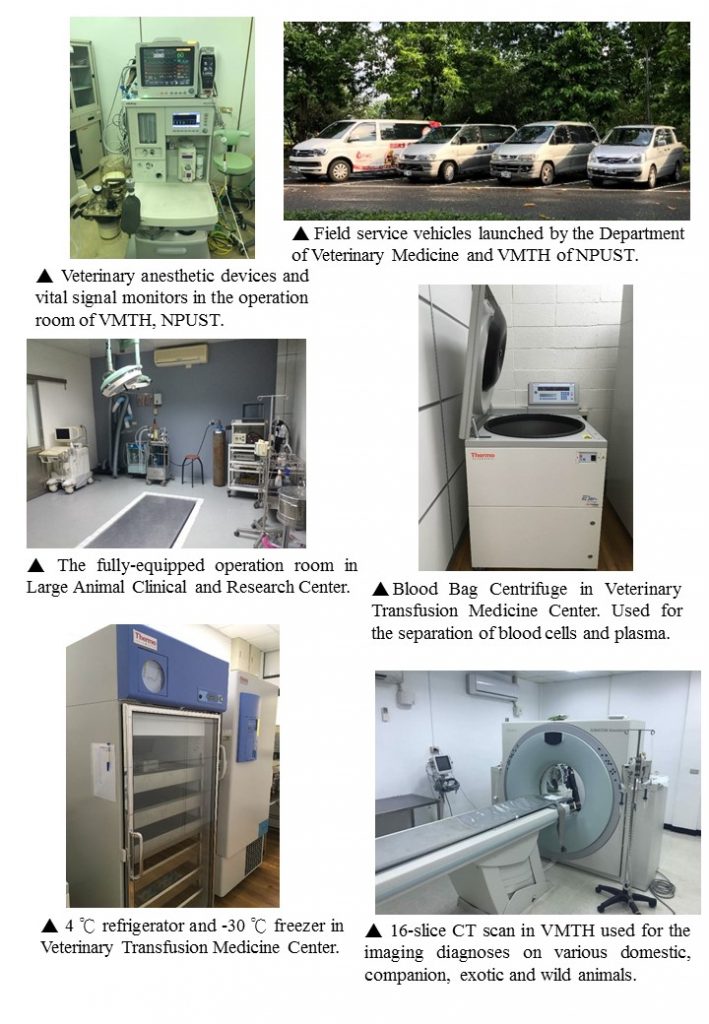
- 08-770-3202#5051
- vm@mail.npust.edu.tw
- 912屏東縣內埔鄉學府路1號
